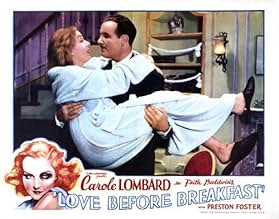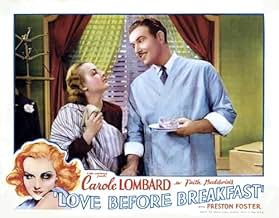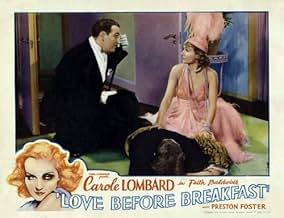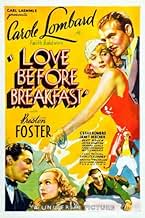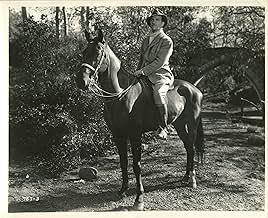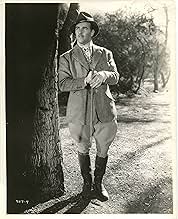VALUTAZIONE IMDb
6,2/10
935
LA TUA VALUTAZIONE
Aggiungi una trama nella tua linguaA rich businessman stalks another man's fiancée.A rich businessman stalks another man's fiancée.A rich businessman stalks another man's fiancée.
- Regia
- Sceneggiatura
- Star
Diana Gibson
- Secretary
- (as Diane Gibson)
George Beranger
- Charles
- (as George Andre Beranger)
Sylvia Andrew
- Secretary
- (non citato nei titoli originali)
William Arnold
- Waiter
- (non citato nei titoli originali)
Jimmy Aye
- Petty Officer
- (non citato nei titoli originali)
Ed Barton
- Jerry - Cabby
- (non citato nei titoli originali)
Jay Belasco
- Undetermined Secondary Role
- (non citato nei titoli originali)
Recensioni in evidenza
I enjoyed "Love Before Breakfast" very much and think with a slight re-write it could have earned a 9, as it was a nice little screwball comedy.
The film begins with a very rich industrialist (Preston Foster) buying an oil company just so he can transfer a guy overseas (Cesar Romero) in order to have a chance at the girl (Carole Lombard). Now Foster isn't a total jerk--the transfer is a promotion for Romero and he's thrilled to take it. The plan is for Romero to stay in Japan for two years and then return to marry Lombard. However, it's pretty obvious that this relationship has some problems--not the least of which is the conniving Foster. Now it could be easy to dislike Foster since he is manipulative and a bit of a stalker, however, the writers did a good job making his character likable. He's rich but a pretty swell guy. Heck, I might have married him if he'd asked! But, as for Lombard, she gives him a very hard time--after all, Foster IS responsible for the boyfriend going overseas. And, after a while, she does come to like Foster and is willing to marry him instead. However, Foster isn't happy with this--after all, if Romero was home, would she still be willing to do this? So, he brings Romero back and treats him with every kindness to allow Lombard a chance to choose. Who she chooses, how and why is something you'll just have to see for yourself.
I liked this story very much, but did have a complaint about one thing. I think that Lombard's character was made a bit too volatile and annoying. It got bad enough towards the end that I could not believe that Foster would still want such a nasty...um...'lady'. As for the rest of the cast, they are quite dandy. I liked Lombard's mother and the dog (an adorable little thing), but I especially liked the small part played by Richard Carle--he wasn't in the movie a lot, but was great in the scenes where he appeared.
Overall, an enjoyable little comedy only marred, very slightly, by a female character that is, at times, just a bit too annoying and snippy. Still, give it a look--it's a nice forgotten little film.
The film begins with a very rich industrialist (Preston Foster) buying an oil company just so he can transfer a guy overseas (Cesar Romero) in order to have a chance at the girl (Carole Lombard). Now Foster isn't a total jerk--the transfer is a promotion for Romero and he's thrilled to take it. The plan is for Romero to stay in Japan for two years and then return to marry Lombard. However, it's pretty obvious that this relationship has some problems--not the least of which is the conniving Foster. Now it could be easy to dislike Foster since he is manipulative and a bit of a stalker, however, the writers did a good job making his character likable. He's rich but a pretty swell guy. Heck, I might have married him if he'd asked! But, as for Lombard, she gives him a very hard time--after all, Foster IS responsible for the boyfriend going overseas. And, after a while, she does come to like Foster and is willing to marry him instead. However, Foster isn't happy with this--after all, if Romero was home, would she still be willing to do this? So, he brings Romero back and treats him with every kindness to allow Lombard a chance to choose. Who she chooses, how and why is something you'll just have to see for yourself.
I liked this story very much, but did have a complaint about one thing. I think that Lombard's character was made a bit too volatile and annoying. It got bad enough towards the end that I could not believe that Foster would still want such a nasty...um...'lady'. As for the rest of the cast, they are quite dandy. I liked Lombard's mother and the dog (an adorable little thing), but I especially liked the small part played by Richard Carle--he wasn't in the movie a lot, but was great in the scenes where he appeared.
Overall, an enjoyable little comedy only marred, very slightly, by a female character that is, at times, just a bit too annoying and snippy. Still, give it a look--it's a nice forgotten little film.
I love Lombard as much as the next person. What's not to love? But this movie is shocking. I liked Kay Colby for 30 or so minutes, but then, as she became more angry, shrill, and mean, I came to thoroughly dislike the brat. Yet, even drenched, sneezing, and bundled in a too-big bathrobe,running wild and out of control, she's gorgeous, which is apparently why Foster is besotted with her. Her escalating infantile behavior should have been a wake-up call to her suitor that he'd best run for the hills, but instead he rustles up a minister and marries her, while she protests in the marriage vows that she will not obey. I see a quickie Reno divorce hot on the heels of the honeymoon.
Preston Foster is much criticized for not being as charming as Cary Grant, or as attractively domineering as Clark Gable, but I thought his performance was fine. However, the character he played was not so fine. Back in the 30s women may have thought it was romantic to be so desired that a suitor would go to any lengths to win her, but today it looks like stalking. Still, I warmed up to him when he said he was breaking their engagement because he wanted her to be in love with him. This was an interesting plot turn but the scriptwriters fell down on the job by not developing this. Instead, they made Lombard's character unlikeable, and that's not a nice thing to do to any star, let alone Lombard.
Preston Foster is much criticized for not being as charming as Cary Grant, or as attractively domineering as Clark Gable, but I thought his performance was fine. However, the character he played was not so fine. Back in the 30s women may have thought it was romantic to be so desired that a suitor would go to any lengths to win her, but today it looks like stalking. Still, I warmed up to him when he said he was breaking their engagement because he wanted her to be in love with him. This was an interesting plot turn but the scriptwriters fell down on the job by not developing this. Instead, they made Lombard's character unlikeable, and that's not a nice thing to do to any star, let alone Lombard.
Love Before Breakfast features an amusing love triangle between three shallow, selfish characters, played to perfection by Carole Lombard, Preston Foster, and Cesar Romero. Foster, a filthy rich oil baron, "pushes buttons" to have employee Romero, Carole's fiancé, sent to Japan, so he can move in on Carole. Carole is devastated the man she loves is leaving her for two years, but the unworthy object of said love has a hard time hiding his glee at the promotion the overseas job means. Even as his ship sails with poor Carole tearfully waving goodbye, true love Ceasar can be seen at the railing obviously enjoying the attentions of a sexy countess, played with carnivorous exuberance by buxom Betty Lawford. Foster's character is such an egomaniac he smugly brags to Carole about his fiancé-to-Japan manipulation. Thus begins the battle of wills between Carole and Foster that lasts for the rest of this entertaining, witty, little "white telephone movie". They take turns alternately courting and resisting each other with lots of dirty tricks along he way. Both principles have wicked senses of humor. Preston thinks it's hilarious when Carole gets her eye blacked in a night club brawl she engineered. Her get-even prank is to set him up at the local riding club with an evil tempered horse that is sure to throw him. The entire episode at the stable is the funniest in this very amusing picture, except perhaps for the riotous closing scene.
One of the charms of this little comedy is very strong but subtle characterization, thanks to light comedy specialist Walter Lang's expert direction and a script which was surprisingly clever, considering that it seems to have been virtually committee written. Herbert Fields gets credit for the screenplay, but with input from no less than six other writers, including Preston Sturges! Of the Carole Lombard pictures yours truly has seen, this one gives her the best character. In some of her other movies she is just too much of a dizzy dame to be appealing. Especially in My Man Godfrey (1936), in which she's so foolish and childish, she seems almost retarded. In Love Before Breakfast Carole comes off more sophisticated, clever, and witty. Never mind she is spoiled, self-centered, wishy-washy, and lazy -- she lives in a swank apartment with her well-off mother (likeable Janet Beecher) and seems to have never even considered getting a job. And of course Carole is beautiful. Her beauty is well accented by Ted Tetzlaff's gloriously luminous black and white photography, a standout job here even in an era when terrific cinematography is practically taken for granted. The left side of Carole Lombard's gorgeous face was tragically scarred in a late 1920's automobile accident. Even the best of Hollywood makeup couldn't quite cover it, so that special care had to be taken with lighting and camera angles. Tetzlaff washes Carole's closeups in tenebristic shadowing which illuminates only the right side. A generous use of soft focus for her closeups seems to have set the tone for the overall look of the picture, and a very pleasing look it is.
Love Before Breakfast is a typical example of a type of picture called "white telephone movie" in the trade. Younger people, used to telephones of all sizes, shapes, and colors, may not remember, as sadly aged oldblackandwhite does, when nearly every one of them was an unglamorous, utilitarian, flat black. Only rich folks had the glossy white ones that you had to special order and pay extra for on your telephone bill. Hence white telephone movies are about rich guys and rich babes lounging in their ritzy apartments and palatial mansions, going out to glittering night clubs, sailing on their swell yachts, and gabbing on their white telephones. Standard cinema history wisdom portrays this type of movie as especially made for the depressed poor of the Great Depression, who wanted to escape into such fantasies, rather than watch any realistic social melodrama that would remind them of their own distressed lives. The Depression may have made white telephone movies more popular all right, but please note that the same type of picture was very popular in the 1920's, a period of previously unexampled prosperity, and continues to to be popular in various altered forms to this day.
Love Before Breakfast is a solid white telephone job. Charming cast, clever story, plush sets, sensuous cinematography, witty, amusing dialog, fast pacing, and funny gags. A lot of glossy, smooth Old Hollywood entertainment packed into and hour and ten minutes.
One of the charms of this little comedy is very strong but subtle characterization, thanks to light comedy specialist Walter Lang's expert direction and a script which was surprisingly clever, considering that it seems to have been virtually committee written. Herbert Fields gets credit for the screenplay, but with input from no less than six other writers, including Preston Sturges! Of the Carole Lombard pictures yours truly has seen, this one gives her the best character. In some of her other movies she is just too much of a dizzy dame to be appealing. Especially in My Man Godfrey (1936), in which she's so foolish and childish, she seems almost retarded. In Love Before Breakfast Carole comes off more sophisticated, clever, and witty. Never mind she is spoiled, self-centered, wishy-washy, and lazy -- she lives in a swank apartment with her well-off mother (likeable Janet Beecher) and seems to have never even considered getting a job. And of course Carole is beautiful. Her beauty is well accented by Ted Tetzlaff's gloriously luminous black and white photography, a standout job here even in an era when terrific cinematography is practically taken for granted. The left side of Carole Lombard's gorgeous face was tragically scarred in a late 1920's automobile accident. Even the best of Hollywood makeup couldn't quite cover it, so that special care had to be taken with lighting and camera angles. Tetzlaff washes Carole's closeups in tenebristic shadowing which illuminates only the right side. A generous use of soft focus for her closeups seems to have set the tone for the overall look of the picture, and a very pleasing look it is.
Love Before Breakfast is a typical example of a type of picture called "white telephone movie" in the trade. Younger people, used to telephones of all sizes, shapes, and colors, may not remember, as sadly aged oldblackandwhite does, when nearly every one of them was an unglamorous, utilitarian, flat black. Only rich folks had the glossy white ones that you had to special order and pay extra for on your telephone bill. Hence white telephone movies are about rich guys and rich babes lounging in their ritzy apartments and palatial mansions, going out to glittering night clubs, sailing on their swell yachts, and gabbing on their white telephones. Standard cinema history wisdom portrays this type of movie as especially made for the depressed poor of the Great Depression, who wanted to escape into such fantasies, rather than watch any realistic social melodrama that would remind them of their own distressed lives. The Depression may have made white telephone movies more popular all right, but please note that the same type of picture was very popular in the 1920's, a period of previously unexampled prosperity, and continues to to be popular in various altered forms to this day.
Love Before Breakfast is a solid white telephone job. Charming cast, clever story, plush sets, sensuous cinematography, witty, amusing dialog, fast pacing, and funny gags. A lot of glossy, smooth Old Hollywood entertainment packed into and hour and ten minutes.
The film's premise is straightforward: Lombard plays Kay Colby, a young socialite convinced she's in love with Bill Wadsworth (Cesar Romero), a fellow quickly identified as the douche who is all wrong for her. Her Mr. Right is Preston Foster's Scott Miller, who happens to own the oil company Wadsworth works for.
We quickly discover Miller is in love with Colby. He's also manipulative and sneaky, for as the film opens we find Miller is purposefully sending her rather self-centred beau away on assignment on a ship to Japan . And he manages to finagle it so that his own Ms. Wrong, a yappy countess with an entourage of similarly disposed dogs, is going on the same ship. Colby and Wadsworth bump into him (more accurately, they bump into his parked car and then him) at the dock.
So the stage is set for an epic 2nd act featuring the screwball comedy battle of wills, which will steadily escalate in madness and will only let up in the last minute.
The film is not as wicked as 'Mr. & Mrs. Smith', which has very similar sort of screwball formula (sneaky guy pursuing girl as opposed to sneaky girl pursuing guy ala 'Bringing up Baby'), but like that film, this one features Lombard doing what she does best: make you want to kiss and kill her at the same time. She's so good that it makes up for the inadequacies of the leading man, Preston Foster, who is not a good enough listener as an actor to create the sort of chemistry a William Powell or Cary Grant could form with an ugly lamp (see Powell's work in 'My Man Godfrey' opposite Lombard, whom he had not too long before filming divorced!). Foster's all right when we don't have to watch him react to Lombard, but his comic timing and general shtick is uneven. I suspect the director must have figured this out, as the camera is kind in allowing her to create the illusion of a relationship twixt the two a fair amount of the time.
Another interesting phenomenon is the visceral similarity in appearance of the two men (they look alike and both have dark hair with trimmed mustaches) vying for Lombard's Colby, which was aesthetically dissonant for me. I think at the very least one of the staches could have gone, just so douche-bag and good guy don't become perceptually associated in our minds.
The indulgence of quibbles aside, the film's moments of charm and Lombard's mastery of screwball comedy's delectable form of erotica make it well worth seeing if you're fond of the genre.
We quickly discover Miller is in love with Colby. He's also manipulative and sneaky, for as the film opens we find Miller is purposefully sending her rather self-centred beau away on assignment on a ship to Japan . And he manages to finagle it so that his own Ms. Wrong, a yappy countess with an entourage of similarly disposed dogs, is going on the same ship. Colby and Wadsworth bump into him (more accurately, they bump into his parked car and then him) at the dock.
So the stage is set for an epic 2nd act featuring the screwball comedy battle of wills, which will steadily escalate in madness and will only let up in the last minute.
The film is not as wicked as 'Mr. & Mrs. Smith', which has very similar sort of screwball formula (sneaky guy pursuing girl as opposed to sneaky girl pursuing guy ala 'Bringing up Baby'), but like that film, this one features Lombard doing what she does best: make you want to kiss and kill her at the same time. She's so good that it makes up for the inadequacies of the leading man, Preston Foster, who is not a good enough listener as an actor to create the sort of chemistry a William Powell or Cary Grant could form with an ugly lamp (see Powell's work in 'My Man Godfrey' opposite Lombard, whom he had not too long before filming divorced!). Foster's all right when we don't have to watch him react to Lombard, but his comic timing and general shtick is uneven. I suspect the director must have figured this out, as the camera is kind in allowing her to create the illusion of a relationship twixt the two a fair amount of the time.
Another interesting phenomenon is the visceral similarity in appearance of the two men (they look alike and both have dark hair with trimmed mustaches) vying for Lombard's Colby, which was aesthetically dissonant for me. I think at the very least one of the staches could have gone, just so douche-bag and good guy don't become perceptually associated in our minds.
The indulgence of quibbles aside, the film's moments of charm and Lombard's mastery of screwball comedy's delectable form of erotica make it well worth seeing if you're fond of the genre.
Having now watched Universal’s CAROLE LOMBARD: THE GLAMOUR COLLECTION in its entirety, I can say that of the 6 films included two are classics – HANDS ACROSS THE TABLE (1935) and TRUE CONFESSION (1937) – two more are lesser efforts but still delightful – WE’RE NOT DRESSING (1934) and THE PRINCESS COMES ACROSS (1936) – while the remaining two titles are essentially routine and wouldn’t have stood a chance had they been released on their own (the set being devoid of any substantial extras, they could then be considered as such).
That is not to say that this particular vehicle (which I wasn’t familiar with) isn’t a pleasant diversion per se – at 70 minutes, it’s certainly innocuous enough; still, comparing it to the comic gems on offer in this set, it definitely comes up lacking! To begin with, there’s nothing remotely original about either plot (Lombard is torn between two men – one is wealthy and conceited but genuinely in love, the other is ambitious and something of a playboy) or setting (high society); true, this type of romantic comedy was typical for Depression-era America – but it’s among the most trivial examples of escapist fare that I’ve watched!
Besides, Lombard is let down by her leading men – after all, Preston Foster and Cesar Romero are hardly Fred MacMurray and Ralph Bellamy (who played similar, but more rounded, characters in HANDS ACROSS THE TABLE)...and the same thing can be said of director Walter Lang (here demonstrating little of the style conveyed by Mitchell Leisen throughout HANDS, or even the inspired craziness of TRUE CONFESSION). Actually, the whole enterprise feels invincibly second-rate: however, one shouldn’t blame this on the change in studio from Paramount (which made all the other titles in this set) to Universal because, truth be told, Lombard’s next outing – MY MAN GODFREY (1936; also released by the latter) – proved to be one of her best films!
LOVE BEFORE BREAKFAST, then, features all the typical ingredients: love/hate relationship, misunderstanding, embarrassment, romantic threat, etc. Richard Carle appears as an elderly gentleman who, in spite of being a bachelor, offers Foster advice on his amorous situation; climaxing with an unconvincing storm at sea, this sequence is nonetheless capped by an amusing – and most unconventional – wedding ceremony presided over by familiar character actor E. E. Clive!
That is not to say that this particular vehicle (which I wasn’t familiar with) isn’t a pleasant diversion per se – at 70 minutes, it’s certainly innocuous enough; still, comparing it to the comic gems on offer in this set, it definitely comes up lacking! To begin with, there’s nothing remotely original about either plot (Lombard is torn between two men – one is wealthy and conceited but genuinely in love, the other is ambitious and something of a playboy) or setting (high society); true, this type of romantic comedy was typical for Depression-era America – but it’s among the most trivial examples of escapist fare that I’ve watched!
Besides, Lombard is let down by her leading men – after all, Preston Foster and Cesar Romero are hardly Fred MacMurray and Ralph Bellamy (who played similar, but more rounded, characters in HANDS ACROSS THE TABLE)...and the same thing can be said of director Walter Lang (here demonstrating little of the style conveyed by Mitchell Leisen throughout HANDS, or even the inspired craziness of TRUE CONFESSION). Actually, the whole enterprise feels invincibly second-rate: however, one shouldn’t blame this on the change in studio from Paramount (which made all the other titles in this set) to Universal because, truth be told, Lombard’s next outing – MY MAN GODFREY (1936; also released by the latter) – proved to be one of her best films!
LOVE BEFORE BREAKFAST, then, features all the typical ingredients: love/hate relationship, misunderstanding, embarrassment, romantic threat, etc. Richard Carle appears as an elderly gentleman who, in spite of being a bachelor, offers Foster advice on his amorous situation; climaxing with an unconvincing storm at sea, this sequence is nonetheless capped by an amusing – and most unconventional – wedding ceremony presided over by familiar character actor E. E. Clive!
Lo sapevi?
- QuizAlthough Faith Baldwin is credited onscreen as writer of a novel, it was actually just a short story in a magazine. No novel was ever published.
- BlooperAbout 5 minutes into the movie, a horse-drawn taxi backs into a car & damages it's left headlight but in the next scene, it is the right headlight that is damaged & even more so.
- Citazioni
Kay Colby: Incidentally, what's happened to the Count? Where is he?
Scott Miller: Where are the snows of yesteryear?
Kay Colby: Where the woodbine twineth.
Scott Miller: That's where the Count is.
- Curiosità sui creditiCard after ending credits: "Thank You"
- Versioni alternativeThere is an Italian edition of this film on DVD: " LA BISBETICA INNAMORATA (1938) + FESTA D'AMORE (1945)", distributed by DNA Srl (2 Films on a single DVD), re-edited with the contribution of film historian Riccardo Cusin. This version is also available for streaming on some platforms.
- ConnessioniReferenced in Hollywood Hist-o-Rama: Carole Lombard (1961)
- Colonne sonoreThe Old Gray Mare
(uncredited)
Traditional
Sung by the college boys after the brawl
I più visti
Accedi per valutare e creare un elenco di titoli salvati per ottenere consigli personalizzati
- How long is Love Before Breakfast?Powered by Alexa
Dettagli
- Data di uscita
- Paese di origine
- Lingua
- Celebre anche come
- Love Before Breakfast
- Luoghi delle riprese
- Azienda produttrice
- Vedi altri crediti dell’azienda su IMDbPro
- Tempo di esecuzione
- 1h 10min(70 min)
- Colore
- Proporzioni
- 1.37 : 1
Contribuisci a questa pagina
Suggerisci una modifica o aggiungi i contenuti mancanti

